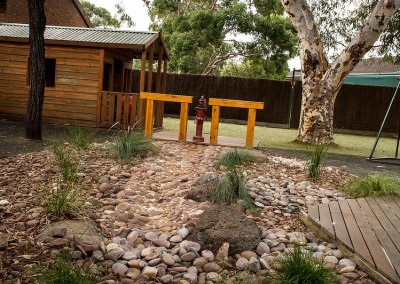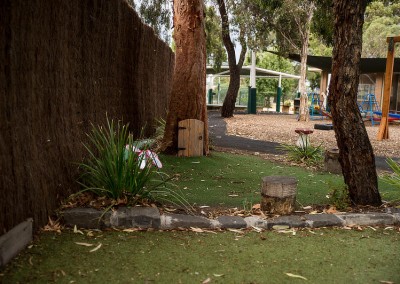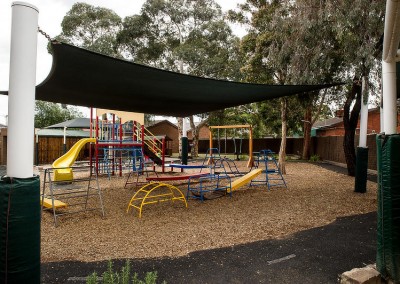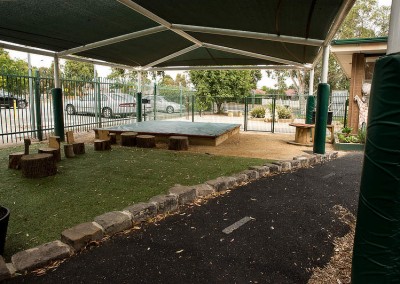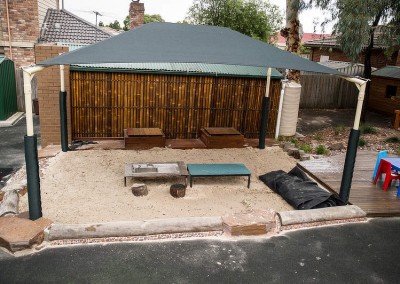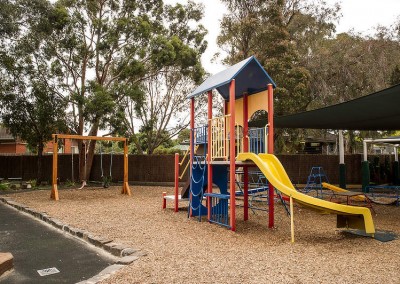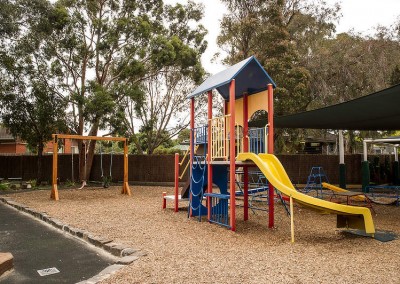About Us
Our Philosophy
South Morang Preschool Association acknowledges Aboriginal and Torres Strait Islander people as the First Peoples of this nation and the Traditional Owners of the land on which we work, play, and learn. We recognise their continuing connection to culture, land, water, and community. We pay our respects to Elders past, present, and emerging. Our services are located on the land of the Wurundjeri People. We value the semi-rural natural environment of our community and acknowledge that our role as educators extends to promoting sustainable practice and care for the environment in order to preserve our natural resources for future generations.
Piaget informs us that “Play is the work of childhood”. We provide dynamic teaching environments, that enable all children to participate in unique and challenging play based educational program. Risky play is valued as one of many opportunities for children to develop self-agency, and responsibility. As the children learn to understand their environment, they become confident to explore and take appropriate risks in their play, associated with their age and stage of development. Children are seen as being capable, confident, and involved learners when nurtured and empowered. We will promote an environment for discovery and curiosity where children can explore their ideas and pursue their questions as they facilitate their own learning.
We respect each child’s individuality and cultural background, value each family’s participation in the program and work in partnership with families to provide the best outcomes for their child. Families are recognised and respected as children’s first and primary educators. We see each child as unique and capable, having their own interests, values, skills, ideas, and talents that have been developed since birth in the context of their families, culture, relationships, and experiences. Within our services we ensure equity of access and inclusive practices for all children, their families, and the wider community in a meaningful and respectful manner.
The Child Safe Standards (July 2022) underpin our values, practice, and policies. Children are provided with opportunities to build their individual strengths, interests, and self-esteem.
Maslow’s hierarchy of needs informs our practice that children learn and develop to their full potential when they feel safe, secure, and respected.
We instil in our children with the thought that they can be whatever they want to be where fun, and laughter fill the air.
teach me and I remember…..
involve me and I learn
We will nurture an environment where all are welcomed.
Our educators will make themselves available to hear your thoughts, fears, and expectations
The health and wellbeing of our children, families and staff is paramount
Families and children will be treated respectfully, equally and fairly
We will acknowledge and embrace each child’s family background and culture
Indigenous heritage is recognised and embraced
We will promote an environment for discovery and curiosity where children can explore their ideas, and pursue their questions
Children will be provided with the opportunity to build their strengths and self esteem
Feel safe and secure
To instil in our children the thought that they can be whatever they want to be
Where fun and laughter fill the air
Child Safe Kindergarten
Stables Kindergarten has zero tolerance for child abuse. Stables Kindergarten is committed to providing a child safe environment where children and young people are safe and feel safe, and their voices are heard about decisions that affect their lives. Particular attention will be paid to the cultural safety of Aboriginal children and children from culturally and/or linguistically diverse backgrounds, as well as the safety of children with a disability.
Every person involved at Stables Kindergarten has a responsibility to understand the important and specific role they play individually and collectively to ensure that the wellbeing and safety of all children and young people is at the forefront of all they do and every decision they make.
- Take a preventative, proactive and participatory approach to child safety;
- Value and empower children to participate in decisions which affect their lives;
- Foster a culture of openness that supports all persons to safely disclose risks of harm to children
- Respect diversity in cultures and child rearing practices while keeping child safety paramount;
- Provide written guidance on appropriate conduct and behaviour towards children;
- Engage only the most suitable people to work with children and have high quality staff and volunteer supervision and professional development;
- Ensure children know who to talk with if they are worried or are feeling unsafe, and that they are comfortable and encouraged to raise such issues
- Report suspected abuse, neglect or mistreatment promptly to the appropriate authorities;
- Share information appropriately and lawfully with other organisations where the safety and wellbeing of children is at risk; and
- Value the input of and communicate regularly with families and carers.
The following policies support our work and commitment to keeping children safe.
Policies
Our policies underpin all the practice that happens within our service, as well as ensuring that all the necessary legislation is met
The policies are available below, and we encourage our community to become familiar with them. Hard copies are also avalilable at the service.
When policies come up for review, we welcome our community’s feedback.
2023 Information Brochure
The following policies are available at our kindergarten.
- Acceptance and Refusal of Authorisations Policy
- Administration of First Aid Policy
- Administration of Medication Policy
- Anaphylaxis Policy
- Asthma
- Child Safe Environment Policy
- Code of Conduct and Zero Tolerance on the Abuse of Staff Policy
- Compliments and Complaints Policy
- Curriculum Development Policy
- Dealing with Infectious Diseases Policy
- Dealing with Medical Conditions Policy
- Delivery and Collection of Children Policy
- Determining Responsible Person Policy
- Diabetes Policy
- Emergency and Evacuation Policy
- Enrolment and Orientation Policy
- Environmental Sustainability Policy
- Epilepsy Policy
- Excursions And Service Events Policy
- Extreme Weather Policy
- Fees Policy
- Food Safety Policy
- Governance And Management Of The Service Policy
- Hygiene Policy
- Incident, Injury, Trauma And Illness Policy
- Inclusion And Equity Policy
- Information and Communication Technology Policy
- Interactions with Children Policy
- Mental Health and Wellbeing Policy
- Non Smoking Policy
- Nutrition, Oral Health And Active Play Policy
- Occupational Health And Safety Policy
- Parent Helper Policy
- Participation of Volunteers and Students Policy
- Prevention of Harassment and Bullying Policy
- Privacy and Confidentiality Policy
- Relaxation and Sleep Policy
- Road Safety Education and Safe Transport Policy
- Staff Health and Wellbeing Policy
- Staff Vaccination Policy
- Staffing Policy
- Sun Protection Policy
- Supervision of Children Policy
- Tobacco, Alchol and Other Drugs Policy
- Water Safety Policy
Community
Bethel Aged Care
Not all children have grandparents or the opportunity to interact with the elderly.
With this in mind, Anna Fielding, our Educational Leader approached Bethel Aged Care with the aim of exploring the possibility of organising the kindergarten children to visit the residents.
Management at Bethel Aged Care were very open minded and excited, and work began between our two services.
We partnered with the Department of Education and Training, St. Francis of Assisi Primary School, our families, our committee of management and Dysons Bus Company who have been extremely generous in supporting this initiative.
This partnership has blossomed; the children are excited each time we visit, and the residents faces beam when they see the children walk in. The interactions between the two is very heart warming as they engage in planned activities organised by both Bethel Aged Care and the Kindergarten teachers.
Earlier this year, the residents visited the children at the kindergarten, they were very excited and prepared some refreshments for them to share. The children were very proud to show the residents around their “kinder” and spent time drawing, painting, and reading.
On occasion the relatives of the residents have commented on how wonderful this program is and the positive feedback from families has been overwhelming.
With the support of all the stakeholders involved, we would like to see this program continue.
Narragunnawali - Reconciliation Action Plan
Over the past 12 months we have been working on implementing a Reconciliation Action Plan for 2018 and beyond. This is an initiative titled Narragunnawali Reconciliation in Schools and early Learning. Its purpose is to formally and holistically integrate the Indigenous perspective into the early learning program.
In the playroom:
- enhance teaching and learning activities by engaging Aboriginal and Torres Strait Islander people from within the early learning community.
- teach about the concept, history and progress of reconciliation in Australia.
- raise awareness of current affairs and issues in the public domain that are of particular significance to Aboriginal and Torres Strait Islander peoples and the process of reconciliation.
- ensure Aboriginal and Torres Strait Islander histories and cultures are incorporated in curriculum planning, development and evaluation processes.
We submitted our Reconciliation Action Plan for review and are very happy to advise that it was approved and published. This does not mean that our work is over, as we consider the R.A.P a living document and our commitment to this program will ensure that we continue our work and update the document as we go.
For more information please visit https://www.narragunnawali.org.au/
No Jab No Play – information for parents
Changes to the Victorian Law
Under the ‘No Jab, No Play’ legislation, before enrolling a child, early childhood education and care services have to first obtain evidence that the child is up to date with all vaccinations that are due for their age, or that they are able to receive. On 28 February 2018, the ‘No Jab, No Play’ legislation was amended so that an Immunisation History Statement from the Australian Immunisation Register (AIR) is the only form of documentation accepted for the purpose of enrolling in an early childhood education and care service. Previous forms of documentation, for example a letter from a GP or local council, are no longer accepted.
About required documentation
Under ‘No Jab, No Play’ what documentation is required as evidence of up-to-date vaccination?
To have an enrolment confirmed for a child in long day care, kindergarten, family day care or occasional care, parents/carers have to provide the service with:
• a current Immunisation History Statement from the Australian Immunisation Register (AIR); AND
• the statement must show that the child is up to date with all vaccinations that are due for their age, or that they are able to receive.
The Immunisation History Statement from the AIR lists the vaccines the child has received and, if applicable, which vaccines are due in the future and when. Medical exemption may also be listed, where applicable.
An Immunisation History Statement from the AIR is the only type of immunisation record accepted by early childhood and care services for the purposes of confirming enrolment and must be provided within the two months prior to the child starting at the service.
The Medicare logo and Australian Government crest must be present and identifiable to be considered a valid Immunisation History Statement. For example, if the statement is page two of a letter from Medicare, both pages need to be presented to the service to confirm enrolment.
How can parents/carers get an Immunisation History Statement from the AIR?
You can print a copy of your child’s Immunisation History Statement from your myGov account. If you have difficulty getting a copy via your myGov account you can:
• call the AIR on phone 1800 653 809
• visit a Medicare or Centrelink office.
Families who do not hold a Medicare card must call the AIR to request an Immunisation History Statement.
A Translating and Interpreting Service is available by calling 131 450, Monday to Friday from 8:30am to 4:45pm.
Can parents/carers provide proof of immunisations from an immunisation provider (e.g. a GP)?
No. Other forms of documentation, for example a letter from a GP or local council, are no longer accepted.
What is considered a ‘medical exemption’ under ‘No Jab, No Play’ and what documentation is required as evidence?
Some children may be exempt from the requirement to be fully vaccinated on medical grounds. Examples of valid medical reasons that a child could not be fully vaccinated include:
• an anaphylactic reaction to a previous dose of a particular vaccine, or
• an anaphylactic reaction to any vaccine component
• has a disease which lowers immunity (such as leukaemia, cancer, HIV/AIDS, SCID), or
• is having treatment which lowers immunity (such as chemotherapy).
Parents/carers who think their child may require a medical exemption to one or more vaccines should consult their GP.
If a child has a valid medical reason they cannot be vaccinated, a GP needs to complete and sign a Medicare Immunisation Exemption Medical Contraindication Form, and send it to the AIR.
The parent/carer then needs to obtain an updated Immunisation History Statement from the AIR that indicates the child is up-to-date with all the vaccines that they can have, and listed the vaccines that they cannot have due to a medical contraindication. This statement needs to be provided by the parent/carer to the early childhood service to confirm enrolment.
If parents/carers have questions or concerns about immunisation or particular vaccines, they should seek answers from a qualified source, such as a GP or local council immunisation service. The Better Health Channel also provides quality-assured information online.
What do parents/carers whose child’s vaccinations are not up-to-date need to do to obtain acceptable documentation?
If a child’s vaccinations are not up-to-date then parents/carers should consult their GP or local council immunisation service about bringing the child’s vaccinations up to date.
The GP or local council immunisation service needs to give all vaccinations that are due for their age, or that they are able to receive, and inform the AIR. The parent/carer then needs to request an updated Immunisation History Statement from the AIR.
The updated Immunisation History Statement showing that vaccines are ‘up-to-date’ needs to be provided by the parent/carer to the early childhood service to confirm enrolment.
How can parents/carers obtain acceptable documentation if their child was vaccinated overseas?
Children who were vaccinated overseas must have their vaccine records assessed by a GP or local council and be offered catch-up vaccinations as required. The GP or local council will then record overseas vaccines to AIR by submitting the AIR Immunisation History form.
The AIR updates the child’s records and the parents/carers can request an Immunisation History Statement. Statement from the AIR and provide the statement to the early childhood service to confirm enrolment.
Families who experience difficulty accessing vaccinations or the required documents can seek support and guidance from the early childhood service. They may be eligible to enrol under the Grace Period provision.
About the grace period
What about vulnerable children who are behind on their vaccinations and find it difficult to access the required documentation or immunisation services?
There are some children in the community whose families face difficulties accessing vaccinations and/or the required documentation to prove immunisation status.
Under the legislation, some families are eligible to enrol and commence at the childcare/kindergarten service, under a ‘grace period’ provision, while they bring their children’s vaccinations up-to-date and/or obtain the required documentation.
Early childhood education and care services, with help from the Departments of Health and Human Services and Education and Training, will support families of children who are not up-to-date with their vaccinations and provide them with information as to where they can access vaccinations.
Who is eligible for the grace period?
Children experiencing vulnerability and disadvantage are eligible to enrol in a service under a grace period, without having provided proof of up-to-date immunisation. The grace period provisions allow the family to continue to access early childhood education and care services while receiving information and assistance to get their child’s immunisations up to date and to obtain the required Immunisation History Statement from the AIR that needs to be provided to the service.
How long is the grace period?
The grace period is for 16 weeks commencing from the date that the child first attends the service.
What needs to happen during the grace period?
Parents/carers
During the 16 week grace period parents/carers should endeavour to have their child vaccinated if required, and/or obtain the required Immunisation History Statement from the AIR and provide it to the service.
Early childhood services can provide parents/carers with support and information to do this.
Early Childhood Education and Care Services
During the 16 week grace period, early childhood education and care services are required to take reasonable steps to obtain the required Immunisation History Statement from the AIR.
When can an early childhood education and care service confirm an enrolment?
Having an application accepted or being registered on a waiting list for a place at an early childhood service is not a confirmed enrolment.
Confirmation of enrolment can be given by the service, no more than two months prior to the child first attending, only once the parent/carer has provided the service with:
• a current Immunisation History Statement from the AIR; AND
• the statement must show that the child is up to date with all vaccinations that are due for their age, or that they are able to receive; OR
• is eligible to enrol under the 16 week grace period while the service works with the family to obtain the necessary immunisations/documentation.
An Immunisation History Statement from the AIR is the only accepted document for proving a child’s immunisation status, including that they are up to date with all vaccinations that are due for their age, or that they are able to receive, or have a medical condition that prevents them from being fully immunised for their age.
Evidence required to qualify to enrol under the Grace Period provision varies depending on the circumstances of the family. Families should discuss their individual circumstances with the service.About vaccination
Why are vaccinations so important?
Vaccination is one of the most effective ways of preventing disease worldwide. Modern vaccines provide high levels of protection against an increasing number of diseases which, in some cases, can be fatal. Worldwide, it is estimated that immunisation programs prevent approximately 2.5 million deaths each year.
The current immunisation rate in Victoria for children under five years of age is around 95 per cent. This coverage rate is necessary to halt the spread of highly infectious diseases such as measles.
Immunisation not only protects those people who have been vaccinated, it also protects those in our community who may be unable to receive vaccines themselves, by reducing the prevalence and spread of disease.
What immunisations are required for children at childcare and kindergarten?
The immunisation schedule for vaccines outlines what vaccines are available under the National Immunisation Program and when they should be received.
Where can parents/carers go for immunisation services?
Local council immunisation services (free service), GPs and health clinics can provide immunisation services.
Are vaccines safe?
The scientific evidence supporting vaccination is overwhelming, and the benefits far outweigh the very rare risks.
All vaccines currently available in Australia must pass stringent safety testing before being approved for use by the Therapeutic Goods Administration, Australia’s regulatory authority for therapeutic goods. Safety testing is required by law and is usually done over many years during the vaccine’s development.
Once vaccines are in use, their safety is continually monitored by the Therapeutic Goods Administration and other organisations.
All immunisation providers play an important role in reporting adverse events following immunisation which assists in safety surveillance after a vaccine is registered for use in Australia. In Victoria the agency that receives all reports is SAEFVIC (Surveillance of Adverse Events Following Vaccination in the Community) – more information at the SAEFVIC website or 1300 882 924, option one.
About the ‘No Jab, No Play’ law
What is the objective of the ‘No Jab, No Play’ law?
The purpose of the No Jab, No Play law is to help increase immunisation rates for young children in the community.
The legislation is designed to:
• provide a prompt regarding immunisation for parents/carers enrolling their child in early childhood education
• allow for children of families experiencing vulnerability and disadvantage to be able to access the lifelong benefits of early childhood education and care, while being supported to obtain vaccinations and/or required evidence of vaccination.
Since the introduction of the legislation in 2016, immunisation coverage rates for young children have been steadily increasing in Victoria and are now at around 95 per cent.
What early childhood services does the ‘No Jab, No Play’ law impact?
The law applies to all early childhood education and care services1 in Victoria providing:
• long day care
• kindergarten (including 3 and 4 year old kindergarten)
• occasional care
• family day care.
The law does not apply to:
• enrolment in primary or secondary school (however, please note an Immunisation History Statement from the AIR does need to be provided for enrolling in primary school, however there is currently no requirement for the statement to show the child is up to date with all immunisations)
• children attending an outside school hours care service (after school care, before school care, vacation care)
• enrolments of school children in long day care, family day care or occasional care
• casual occasional care services that offer care of no more than 2 hours per day and no more than 6 hours per week (for example, crèches at gyms and shopping centres) playgroups
• services primarily providing instruction on particular activities (for example, sport, dance or music)
• services primarily provided or shared by family members of the children (and a family member is readily available and retains responsibility for the child).
Shouldn’t immunisation be a personal choice?
The legislation does not mandate vaccinations, nor does it require the administration of vaccines without consent. Parents/carers may continue to make a choice not to vaccinate their children.
Governments have a responsibility to make decisions that balance the best possible community health outcomes with individual choices. Preventing problems before they occur is vital to good health.
The purpose of ‘No Jab, No Play’ is to increase immunisation rates in the community, particularly amongst young children. This is a public health priority, given the serious risk posed by vaccine-preventable diseases and the proven safety and efficacy of vaccines.
Is ‘homeopathic immunisation’ accepted under ‘No Jab, No Play’?
No. ‘Homeopathic immunisation’ is not a recognised form of immunisation. For more information view the Homeopathy and Vaccination fact sheet produced by the National Centre for Immunisation Research
Victorian Prevention and Health Achievement Program

The Stables Kindergarten has successfully received Victorian Government recognition for all health and priority areas and is now a health promoting service.
Over the past few years, we have worked hard in achieving success with each benchmark. This has involved our working teams collaborating with both our immediate and broader community. We would like to thank everyone involved for their time and commitment to this project, which has seen some strong initiatives embedded in our everyday practice.
In short, what this means for our service is that we are better positioned to meet the challenges that sometimes present over the areas of healthy eating and oral health, physical activity, sun protection, providing safe environments for all that enter our service, issues of mental health and well being and tobacco control. The information that we have explored and gathered is also now available to our families and wider community should they require assistance in any of these areas.
This is a fantastic achievement!
We have been successful in achieving the following icons:







